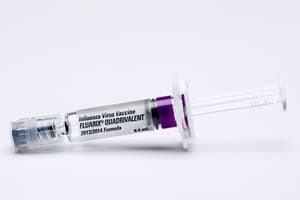
Drug maker GlaxoSmithKline (GSK) has announced a voluntary recall for the remaining doses of its 2014-2015 Flulaval Quadrivalent Thimerosal-free Pre-Filled Syringes (PFS) flu vaccine. The company discovered a reduction in the vaccine’s potency that may reduce the vaccine’s effectiveness. Glaxo notified the Centers for Disease Control and Prevention (CDC) and the Food and Drug Administration […]

Flu Vaccine Recalled Over Potency Problem
Drug maker GlaxoSmithKline (GSK) has announced a voluntary recall for the remaining doses of its 2014-2015 Flulaval Quadrivalent Thimerosal-free Pre-Filled Syringes (PFS) flu vaccine. The company discovered a reduction in the vaccine’s potency that may reduce the vaccine’s effectiveness.
Glaxo notified the Centers for Disease Control and Prevention (CDC) and the Food and Drug Administration (FDA) about the recall and the recall has been posted by the two agencies and by the company. Thirteen lots of the vaccine are affected by the recall: 2B472, 379MY, 42N4L, 5AZ7H, 9A3ZM, ZS95Z, A2PK7, AR57J, DR4GF, YF5DT, F45C5, T3J4S, and XP4J2. GSK has sent a letter to customers who purchased Flulaval Quadrivalent PFS with directions for returning any unused vaccine from these lots.
GSK initiated this recall after routine testing revealed that the potency of some of the Flulaval pre-filled syringes had fallen below the specified potency before the expiration of the vaccine, according to the CDC. Glaxo said the potency issue affects only the pre-filled syringe doses administered in early January 2015 or later. Doses administered before the end of 2014 did not fall below the specified limits. Glaxo said the reduced potency of the GSK Flulaval pre-filled syringes vaccine does not pose a safety concern for anyone who received the vaccine.
Flu vaccines are reformulated each year based on the strains of the virus scientists anticipate will be circulating. Flulaval Quadrivalent PFS flu vaccine is formulated to protect against four influenza (flu) viruses: two influenza A viruses and two influenza B viruses. The issue with the recalled doses is that they were determined to have a slightly reduced potency (less than 5 percent below the minimum specification) for the two influenza B viruses contained in the 2014-2015 Flulaval pre-filled syringes. The loss of potency means that the vaccine no longer meets the manufacturer’s specifications for potency for these particular viruses. (The potency for the two influenza A viruses in the vaccine was within specified limits.) Potency—strength—of a vaccine is determined by the measurement of the concentration of the active ingredient (also called antigen) in the vaccine, the CDC explains. Reduced potency does not necessarily mean people vaccinated with this vaccine received reduced benefit, though it is possible that the benefit will be reduced.
Flu activity declines at this time of year and therefore the CDC does not recommend that people who received the recalled vaccine be re-vaccinated. But anyone who was vaccinated in early January 2015 or later and is concerned about the vaccine’s effectiveness should speak with a doctor. Anyone who received the recalled vaccine and who is planning to travel to the Southern Hemisphere, where flu season is just beginning, may wish to speak to their doctor about flu treatment or prevention options, including being re-vaccinated with another 2014-2015 flu vaccine. The CDC explains that a new flu vaccine has been formulated for the Southern Hemisphere for 2015. Vaccination with a Northern Hemisphere flu vaccine might not provide optimal protection against flu viruses expected to circulate in the Southern Hemisphere in the coming winter months, which is why the CDC recommends that travelers seek a doctor’s advice about appropriate flu vaccine.
More vaccine-related cases:
Read more at: Glaxo Recalls Swine Flu Vaccine


